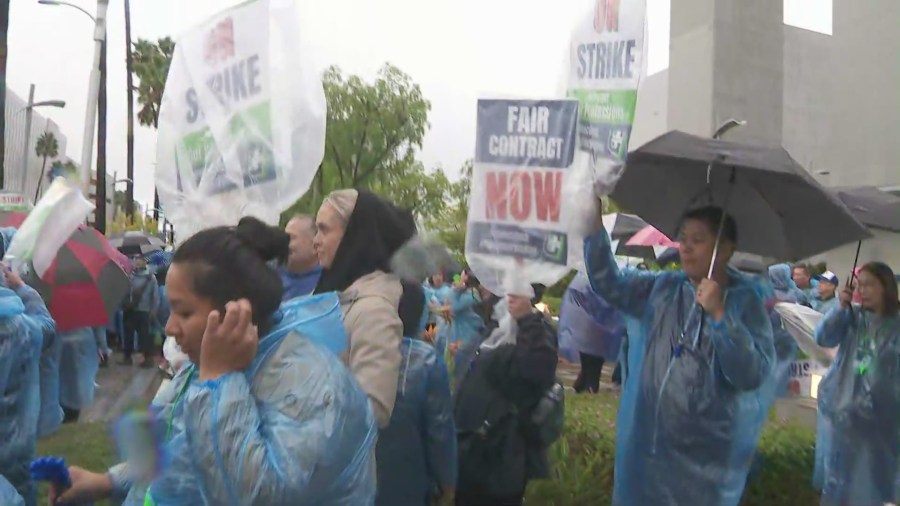Top Stories
Kaiser Strike Ends, Union Claims ‘New Momentum’ for Safety

UPDATE: The historic strike involving over 30,000 Kaiser Permanente healthcare workers has concluded, with union leaders declaring a surge of “new momentum” in ongoing negotiations. The five-day strike, which began on October 14, 2025, spanned more than 500 facilities across the West Coast, igniting tensions over staffing, wages, and patient care quality.
Union representatives from the United Nurses Associations of California/Union of Health Care Professionals (UNAC/UHCP) cited urgent concerns including “unsafe staffing, stagnant wages, and deteriorating patient care conditions” as reasons for the walkout. With 46,000 union members participating, the strike saw the majority of workers—over 31,000—based in California, alongside others from Hawaii and Oregon.
Despite Kaiser Permanente’s claims of a “strong, comprehensive offer,” healthcare workers united on the picket lines, rejecting the proposal and demanding better conditions. The union emphasized that the Joint Commission’s newly released staffing standards during the strike serve as a critical victory, stating, “unsafe staffing is unsafe care,” according to union president and registered nurse Charmaine S. Morales.
As workers return, the union’s message is clear: “Caregivers are united, determined, and backed by a growing movement for safe staffing and fair contracts.” The union plans to meet with Kaiser officials later this month to continue negotiations, with a focus on economic issues, particularly wages.
Kaiser representatives acknowledged the strike’s conclusion, expressing gratitude for the workers who maintained operations during the disruption. They reiterated their commitment to high-quality care while emphasizing their proposal includes a 21.5% total base wage increase over four years, alongside improved medical plans and retiree benefits.
“At a time when healthcare costs are surging, it’s vital to keep quality care affordable,” Kaiser’s statement read. “We recognize our employees’ hard work and are committed to making Kaiser Permanente a great place to work and receive care.”
The urgency of the situation is palpable as the union prepares to keep the pressure on Kaiser for a fair contract that prioritizes patient safety. “This strike may be over, but the fight for patient safety is not,” they stated, emphasizing their resolve.
As negotiations resume on October 22–23, all eyes will be on the outcomes as both sides aim to reach an agreement that addresses the pressing issues shaping the future of healthcare in the region. The implications of this strike and its resolution resonate far beyond the West Coast, marking a significant development in labor relations within the healthcare sector.
-

 Science2 months ago
Science2 months agoUniversity of Hawaiʻi at Mānoa Joins $25.6M AI Initiative for Disaster Monitoring
-

 Health2 months ago
Health2 months agoNew Gel Offers Hope for Regrowing Tooth Enamel in Dentistry
-

 Science1 month ago
Science1 month agoALMA Discovers Companion Orbiting Red Giant Star π 1 Gruis
-

 Lifestyle1 month ago
Lifestyle1 month agoPark Jung Min’s Endearing Moment with Hwasa Steals Show at Awards
-

 Science2 months ago
Science2 months agoIROS 2025 to Showcase Cutting-Edge Robotics Innovations in China
-

 Lifestyle2 months ago
Lifestyle2 months agoStone Island’s Logo Worn by Extremists Sparks Brand Dilemma
-

 Lifestyle2 months ago
Lifestyle2 months agoSampson County Celebrates Susie Faison’s 100th Birthday Milestone
-

 Lifestyle2 months ago
Lifestyle2 months agoMary Morgan Jackson Crowned Little Miss National Peanut Festival 2025
-

 Health2 months ago
Health2 months agoStartup Liberate Bio Secures $31 Million for Next-Gen Therapies
-

 Health2 months ago
Health2 months agoTop Hyaluronic Acid Serums for Radiant Skin in 2025
-

 Science2 months ago
Science2 months agoArizona State University Transforms Programming Education Approach
-

 Politics2 months ago
Politics2 months agoJudge Considers Dismissal of Chelsea Housing Case Citing AI Flaws








